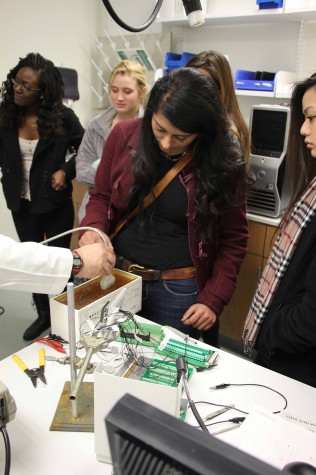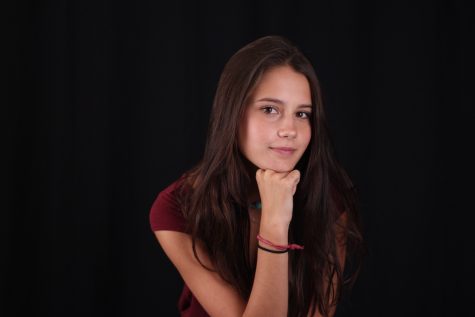Health science gets hands on
Students studying health science received help and instruction from medical professionals, like senior Jacob Poteet.
February 21, 2014
The human brain, heart, and liver, in the hands of teenagars. This is just one of the activities that students in health science and pharmacy tech participated in when they traveled to UT Southwestern Medical Center to learn about ultrasounds, organs, and stitches.
“It’s a medical school in Dallas,” senior Colton Alleman said. “We had three activities. The first one was we got this lecture from a professor there. After that, we went to a cadaver lab. After that we went to this lab with these three med students. They were teaching us how to suture.”
During the first activity, students listened to a lecture from a radiologist who let the students learn and handle real ultrasound technology.

“The first session was with a professor of radiology and he explained the science behind ultrasound technology, and the students got to have hands on time with the ultrasound machine, and kind of experiment with that,” health sciences teacher Amy Tokarz said.
After experimenting with the ultrasound and ultrasound gel, the students headed to the cadaver lab, which was were all of the human organs were placed on a table.
“We went to a cadaver lab. There was this table laid out and the forensic scientist had all of the organs, like real organs, laid out on the table,” Alleman said. “There was a brain, there were livers, hearts, intestines, a uterus, and a spinal cord. It was really cool, and we have to learn about all the parts, we got to touch them and hold them. It was really cool.”
Even though Tokarz has gone on this field trip two times in the past, the odor present in the room seems to remain in both student and teacher brains.
“It’s kind of horrible, but the smells are awful,” Alleman said “It smells terrible in there but you’re not trying to focus on that, you are trying to focus on ‘wow this is really cool, I’m holding a brain.’”
“It does kind of smell in the there; the chemicals that they used,” Tokarz said. “So it does smell, but it doesn’t bother me because I get excited about the students holding the organs and getting to touch and feel and get a better image of what’s going on inside of us.”
If holding real human organs wasn’t enough hands on learning, the students got to see healthy as well as unhealthy organs.
“I’m not very squeamish, so I like that stuff,” senior Devin O’Donnell said. “There were different ones [organs] like one had tumors everywhere, or one heart had more fat on it. It was really cool.”
Holding real organs might make some nauseous, but to some students, the nervousness is masked by excitement.
“I think everyone didn’t know where to set our expectations, because you know you’re holding a real brain or heart that someone once had in their body, but for me personally it was like I wasn’t as freaked out as I thought I would be, but I knew it was still real,” Alleman said. “I was kind of nervous because I didn’t really know what to expect. I was surprised when I got in there. I was more interested than anything.”
The “willed body lab” was followed by four year medical students teaching the high school students how to tie knots or suture a wound.
“Those medical students taught them about suturing or stitching,” Tokarz said. “They taught them basically how to tie knots, and when people get stitches a lot of times it’s just a knot procedure when they take the stitches or the sutures and they tie them in knots to hold the tissue together. So the kids got to do some hands on practice there and got to interact with some medical students.”
Along with holding human body parts, UT Southwestern Medical School seemed to have achieved at least one of its four ‘mission goals’: “[Our mission is] to educate the next generation of leaders in patient care, biomedical science, and disease prevention.”
Not only did the university achieve its mission goal, but the students knew what the expectations were.
“It was basically a way to get experience and learn different things and look at different diverse medical fields, and and see if that’s what interests us,” Alleman said. “They expected us to be professional and pay attention and if that happened to interest us then that’s a good eye opener and you might want to pay attention.”
But instead of this being “another day off of school”, students got valuable career education.
“For me, I was pretty sure that I wanted to do something in health sciences, and it just helped seal the deal,” Alleman said. “I know that I’m really interested in health sciences, but I didn’t know that any of those things are specifically for me, but I know that in general it got me really excited in health sciences and in the medical field. It makes me more inclined to work at hospital, because I know that that excitement is more real in the real life situation instead of reading from a textbook. It made more more determined to do what I want to do. I dont know what I want to do yet, but doing more things like this will help me figure it out.”
To some, going from a textbook to a once beating heart enhances the excitement which enhances learning.
“It was really interesting because you look at a textbook and the teacher lectures you on it, and it’s nothing like when you’re really there and can see it,” Alleman said. “The excitement was so much more real. I absorbed everything from the trip just because I knew it was real life and its actually happening instead of looking in a book. I don’t really obtain that information, but where as when I went on that trip I was so interested in it that I learned everything that they told us.”
Once the class returned to the high school scene, back to textbooks and not livers, the overall experience was said to enhance relationships in the classroom.
“Some of them really enjoyed it,” Tokarz said. “Actually I will say, all of the enjoyed it. Everyone enjoyed something different about it.They were all very well behaved and got a lot out of it. It was a good bonding experience for all of them, as well as just educational in general.”




